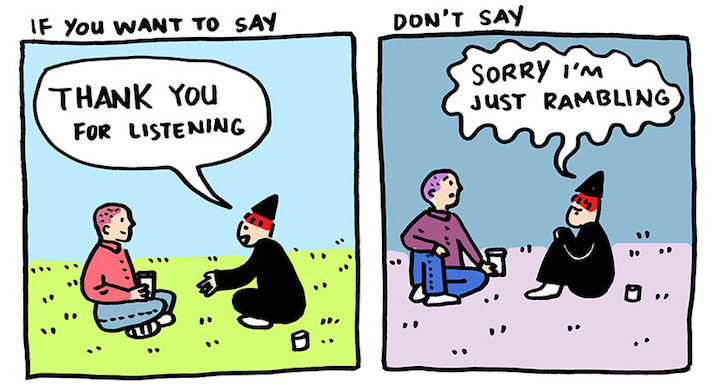My relationship with the words “I’m sorry” changed drastically last year in a crowded New York restaurant.
It was one of those places with dark walls and $15 cocktails, and six of us were squeezed into a table in the back. We were halfway through our bread basket when the friend who’d organized the dinner told us her old friend had decided to join last minute. The uptight side of me I work very hard to hide quietly panicked. Where will he sit? Are the servers going to get mad? Play it cool. When her friend arrived 20 minutes later, the group of us engaged in a speed round of musical chairs to find him a spot, and the music stopped on me: “Haley would you mind taking this seat? I’m so sorry.” My friend was signaling to a chair — a classic Worst Seat: little to no table access, its back to the kitchen (in the kitchen?), its sad wooden countenance conjuring the image of the last kid picked in dodgeball.
I hesitated for a length of time indiscernible to the human eye, but technically a decade in anxiety years, and obliged. Of course I did! The spot ought to have gone to the add-on, yes, but he didn’t know anyone else, so my friend wanted to squeeze him by her. As I took one for the team, she apologized profusely. “I’m so sorry, Haley, I’m sorry, I’m sorry!” Her well-intended apologies made me feel obligated to comfort her instead of bask in my own benevolence, which I’d have much preferred.
“It’s okay seriously!” I kept saying, my voice two octaves above honesty. We repeated this cycle a few more times until she felt better about the whole thing, and then we moved on.
The next day, in reappraising the moment, it became clear to me that the interaction had been about absolving her of guilt rather than acknowledging the favor I was doing her. I wondered how the interaction might have gone had she thanked me profusely instead.
“Sorry” and “thank you” mean very different things, but they’re often used interchangeably in modern dialogue. “Sorry I’m late” could also be “thank you for waiting.” “Sorry to vent” could also be “thank you for listening.” In these situations, both approaches endeavor to deliver the same point — acknowledgement of the other; communication of well intent — but they carry distinctly different tones. I used to shrug off implications that I apologize too much — what’s the harm? — but that game of musical chairs changed me. There’s a sort of emotional chess to using these words, and they can say a lot about the person uttering them.
Let’s break these phrases down. An apology, in its simplest form, is about the apologizer and what they did wrong. A thank you, in contrast, is about the recipient and what they did right. Whereas an apologizer seeks forgiveness, a thanker seeks celebration of another. Both are appropriate in different situations, but I’m convinced that, counter to its sugary aftertaste, chronic apologizing can actually be a smoke signal for self-involvement. Maybe that’s a Juul metaphor, maybe it’s not. Either way, I’ve been the over-apologizer many times, and only in the last year have I finally gone to great lengths to quit. Or more pressingly, examine how I got into the habit in the first place.
The easiest answer, especially for women, is that many of us grow up in pursuit of an impossibly high standard. This leads to a kind of sheepishness around existing: sorry for brushing against you even though we’re on a crowded train; sorry for having a bad hair day; sorry for sneezing three times in a row. Incessant self-consciousness may have broad, insidious roots, but its day-to-day implication is exactly what it sounds like: a constant focus on the self. Overapologizing seems to dovetail nicely with this frame of mind — it saves face, or tries to. If you follow that logic, breaking the habit can be a form of self-acceptance, or growing up.
A lot has been written on the internet about the virtue of replacing “sorry” with “thank you,” and most pieces focus on this exact “empowerment” angle — the idea that skipping the apologies is a way of allowing yourself to take up space. That’s been true in my experience, but I’m even more taken by how the swap transforms its recipient. For example, if I apologize to my boyfriend for being in a sad mood while we’re hanging out, I’m indirectly asking him to comfort me further. And if he replies kindly by saying that it’s okay, he might have to hide his true feelings (that it is, indeed, a bummer, even though he understands). If I thank him instead — for staying by my side, for being so supportive, for carrying us today — he gets rewarded for his kindness by way of my appreciation, no fibs needed. The “thank you” transaction is about him, maybe even us; the “sorry” is about me and my pain. It’s self-involved.
This gets to the root of why I’d have preferred a “thank you” at that restaurant. I would have gotten to say “of course!” and be the good guy, rather than be quietly annoyed at a friend who genuinely meant no harm, but was focused on preserving her self-image rather than the general peace. In my own experience with prioritizing gratitude, I’m never not surprised by that subtle shift in power. As writer Jenny Marchal wrote for Lifehack: “[Thank you is] a very powerful phrase that takes away from ourselves and gives warmth to those around us.”
There is an important time, tone and place for apologies of course, but in the everyday stuff of life — in work and in friendships and in love — little challenges arise constantly, and expressed gratitude does some of the work of making those worth it. Too much sorry, meanwhile, is just kind of annoying.
Published by manrepeller.com


